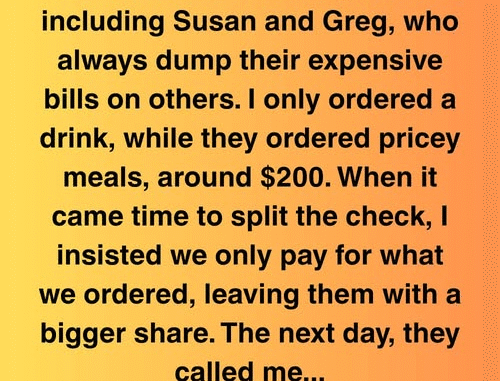
It started with a check.
I went to dinner with my old friend group — the kind that’s been together since college. Susan and Greg were there, of course — the couple who always order lobster, three cocktails, and dessert, then expect everyone to split the bill evenly.
That night, I only had a seltzer.
When the check came, I said, “I’ll pay for what I ordered.”
They weren’t happy.
The next day, Greg called — voice tight, fake-cheerful.
“Hey, Mira. We’re just… concerned. Last night was kind of awkward.”
Susan jumped in: “We always split evenly. It’s how it’s always been.”
I finally said what I’d been holding in for years:
“You two always order everything. I had water. I’m not paying for your wine pairings.”
Silence.
Then Greg: “Maybe just speak up earlier. It’s about the vibe.”
And just like that — I was out.
No more texts.
No more invites.
Group dinners kept happening — without me.
At first, I was hurt.
These were people I’d traveled with, partied with, helped move apartments.
But over time, I realized:
I wasn’t missing them.
I was missing the idea of them — the people they used to be.
So I moved on.
I started hanging out with Rina, a coworker who loved cheap tacos and long walks.
Got closer with my cousin Zora.
Made new memories.
Felt lighter.
Then came Maya’s wedding.
Our old roommate.
Destination, coastal Maine.
Everyone was invited — including me.
I almost didn’t go.
But Maya texted:
“Please come. I miss you. You were always the glue.”
So I did.
The inn was charming — ivy-covered, roses in bloom.
I ran into old friends, laughed on the porch, and for the first time in months, I didn’t feel like I had to tiptoe.
But of course, Susan and Greg showed up — her in a flowy blue dress, him in a coral shirt trying too hard.
They gave me a polite, icy smile.
I nodded back.
That was it.
The next morning, brunch by the water.
Communal tables. Mimosas. Fancy eggs.
I was laughing with people I hadn’t seen in years — when I heard raised voices.
Susan was demanding an off-menu dish.
Greg was using his “I’m a friend of the bride” charm to pressure the overwhelmed chef.
Heads turned.
It was awkward.
Later, Maya pulled me aside.
“Did they always act like this?”
I shrugged. “Only when food was involved.”
She sighed. “I’m regretting the open bar.”
That night, rehearsal dinner.
I was in the back, relaxed, when dessert came — and with it, a bizarre scene.
Susan and Greg were walking table to table with a tip envelope.
“We’re collecting extra for the staff,” Susan announced. “It’s classy.”
But I overheard her whisper: “We already put in $200 — if you can match that…”
I peeked inside the envelope.
No cash.
Just a note: “Suggested per couple: $200.”
I passed it.
Later, I saw Greg stuffing a wad of bills into his wallet.
And it hit me.
They weren’t collecting tips.
They were skimming.
So on-brand, I almost laughed.
The wedding day.
Beautiful ceremony.
Maya glowed.
I cried.
But at the reception — chaos.
The wedding card box — gone.
Vanished.
Security was called.
Guests were asked to stay put.
Then I remembered:
Greg chatting with the bartender.
Hanging around the kitchen.
I told Maya.
She pulled in her uncle, who’d hired private security.
They checked the trash bins near the back exit.
There it was — the box, buried in a garbage bag.
Cards opened.
Cash gone.
And on the lid?
Only Greg’s fingerprints.
Susan claimed he was “moving it for safekeeping.”
No one believed her — especially not after someone said they saw him slip something into his jacket.
They were asked to leave.
Maya didn’t hold back:
“You tried to rob my wedding.”
They walked out — red-faced, silent.
The party erupted.
People danced harder.
Drank freer.
It felt like justice had arrived.
After the cake, I stepped outside for air.
Maya joined me, barefoot on the grass.
“Thank you,” she said. “I’m sorry I didn’t see it sooner.”
“You had better things to focus on,” I smiled.
She tilted her head. “You always knew, huh?”
“Yeah. But I was tired of paying for their filet mignon while pretending everything was fine.”
She laughed. “You’re back on the guest list for life.”
After that weekend, the truth spread.
People started comparing notes.
Times Greg “forgot” his wallet.
Times Susan “borrowed” money and never paid back.
No one was angry.
Just… done.
I didn’t gloat.
But I felt something shift.
Later, I got a message from Neela, a girl I didn’t know.
She’d dated Greg after he and Susan “took a break.”
He told her he was the victim — that I was “vindictive.”
But she met Maya.
Heard the real story.
She wrote:
“I almost believed him. But your name kept coming up like you were the only one telling the truth.”
That hit me.
I thought staying quiet made me peaceful.
But sometimes, silence just protects the people who abuse it.
I didn’t need to fight.
I just needed to stop covering for their lies.
A few weeks later, Maya hosted a barbecue — just close friends.
I brought dessert.
People laughed.
Someone played guitar.
As the sun set, I realized something:
I wasn’t missing out.
Not on anything real.
Susan and Greg built their friendships on charm and convenience.
But people remember how you treat them when no one’s watching.
I don’t know where they are now.
Last I heard, they moved cities.
Started over.
But so did I.
And I like my version better.
The lesson?
Speak up when something feels wrong — especially if it keeps happening.
The right people will respect you for it.
The ones who leave?
They were never your friends.
Just expensive dinner companions with good hair and empty morals.